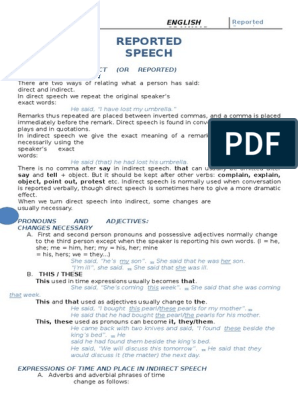0% found this document useful (0 votes)
130 views5 pagesDirect&Indirect Speech
1. The document provides instructions for changing direct speech into indirect speech.
2. Direct speech uses quotation marks to report the exact words spoken, while indirect speech does not use quotation marks and usually involves changing verb tenses and pronouns.
3. When changing direct speech into indirect speech, the tense of the reporting verb determines whether the verb tenses in the direct speech should be changed.
Uploaded by
BINDOSH TRADER'SCopyright
© © All Rights Reserved
We take content rights seriously. If you suspect this is your content, claim it here.
Available Formats
Download as PDF, TXT or read online on Scribd
0% found this document useful (0 votes)
130 views5 pagesDirect&Indirect Speech
1. The document provides instructions for changing direct speech into indirect speech.
2. Direct speech uses quotation marks to report the exact words spoken, while indirect speech does not use quotation marks and usually involves changing verb tenses and pronouns.
3. When changing direct speech into indirect speech, the tense of the reporting verb determines whether the verb tenses in the direct speech should be changed.
Uploaded by
BINDOSH TRADER'SCopyright
© © All Rights Reserved
We take content rights seriously. If you suspect this is your content, claim it here.
Available Formats
Download as PDF, TXT or read online on Scribd
/ 5























































































